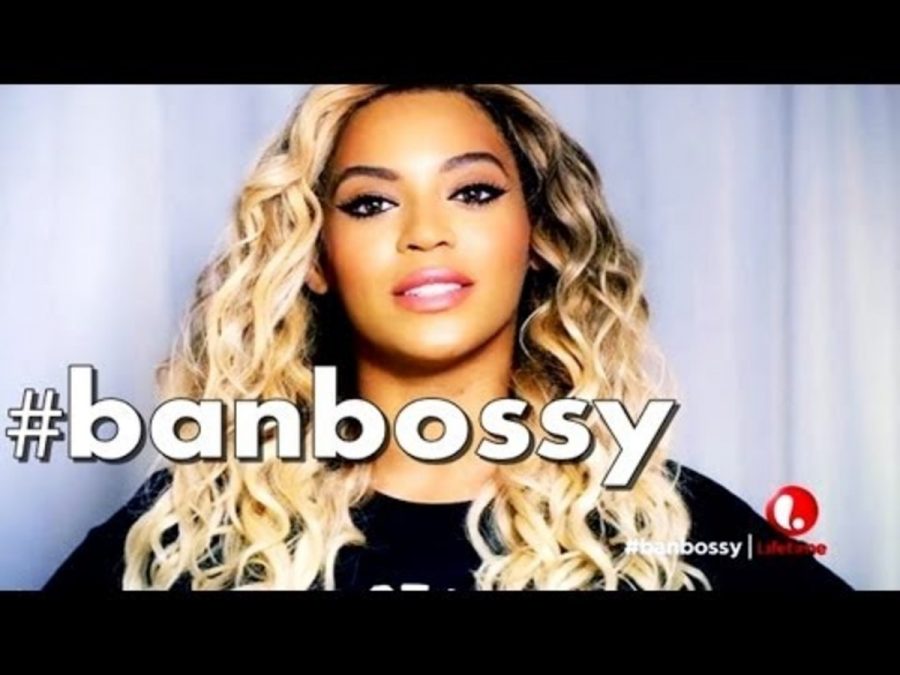By Margaret Hodson ’16, News Editor
Beyoncé is just one of many celebrities endorsing the new “Ban Bossy” Campaign, a joint effort between Sheryl Sandberg’s Leanin.org and the Girl Scouts of the USA, headed by Girl Scouts CEO Anna Maria Chávez. Michele Obama, Condeleeza Rice, Jan Lynch, and Diane von Furstenberg have also publicly voiced support for the campaign. The ultimate goal is to take the word “bossy” out of the vernacular; an effort supporters believe will ultimately help empower girls to be leaders.
Without a doubt, there is a dearth of females in leadership positions. Despite making up 50.8% of the total US population, women hold only 19% of the seats in Congress. The numbers are similarly dire in corporate situations, with women comprising 5% of Fortune 1,000 CEO’s and 17% of corporate board members. There are simply not as many women in positions of power as there are men. Why? This is a complex question with varying intersecting factors, but Sheryl Sandberg and Anna Maria Chávez believe part of the problem could be the word “bossy.”
What exactly does this bossy word mean? According to Oxford Dictionaries, the definition is “Fond of giving people orders; domineering.” Some of the synonyms listed are “Pushy, overbearing, imperious, officious, high-handed, authoritarian,” and even “dictatorial.” So why ban the word? Is there something wrong with labeling domineering people as such? The proponents of the campaign would argue the problem is not the negative connotations, but the distinctly female connotations. It is disproportionately applied to women; According to Google Ngram, (An application which tracks the use and appearance of words in books) the word bossy was four times a likely to refer a female than to a male. The example sentence for Oxford Dictionaries is, “She was headlong, bossy, scared of nobody, and full of vinegar.” Urban Dictionary, generally a good indicator of the informal use of words, lists words related to bossy as “Mean, b****, annoying, rude, ugly, crazy, loud,” and “girl.” To be fair, the remainder of the related words is “Beautiful, nice, smart, sweet, awesome, cute, and funny.” The list of contradictory adjectives muddles the aforementioned definition and negative connotations of bossy, but the distinctly female connotation is unmistakable. While “b****” and “girl” appear on the list, “jerk” and “boy” do not. Urban Dictionary also offers the option to upload pictures related to the word; the only picture uploaded under the page for bossy is a photograph of a sour-faced Hillary Clinton.
Proponents of the campaign would likely argue bossy is applied to women even when they are not being pushy and overbearing. Females are often labeled bossy when they show assertiveness, confidence, and leadership skills: qualities which should not be discouraged, especially in young girls. Personally, I find it hard to believe that women are four times more likely to be pushy and overbearing, as the Google Ngram results would suggest. Women are more likely to be called “bossy” due to gender stereotypes and societal expectations. An equal number of men and women are probably pushy and overbearing, but the appearance of such qualities is accepted in men and discouraged in women. Men and even young boys are expected to show assertiveness, confidence, and leadership skills. The same is not true for women; instead they are labeled “bossy” and discouraged from developing said traits: traits that make for exceptional leaders. The WSJ article launching the campaign even noted this irony: “The irony, of course, is that so-called bossy women make great leaders.” For this reason, some people have argued we should not ban bossy, but instead reclaim it. Change the negative connotation to a positive one, a connotation that encourages female empowerment and leadership. This is certainly a noble, if not viable, goal.
Hidden under all of the bickering about ways to handle the pesky word is a breakthrough that probably has linguists jumping for joy. Bloggers, thinkers, and journalists all over the web are discussing the impact a single word can have upon women. Feminist thinkers have long been writing about the impact of language upon perception and action, notably with words like “slut” and “whore.” The bossy debate represents a deviation from niche blogging; now mainstream media is joining in on the discussion. Such discussion is extremely valuable, as it recognizes the amazing power of language and words. Ironically, the motto of Oxford Dictionaries, whose example sentence calls bossy women “full of vinegar”, is “Language Matters.” Indeed it does, and it’s high time we address the issue of how word choice and prejudice ingrained in language affects the world around us.
“Ban Bossy. Encourage Girls to Lead.” Ban Bossy. Encourage Girls to Lead. N.p., n.d. Web. 12 Apr. 2014. <http://banbossy.com/>.
“Ban Bossy Leadership Tips for Girls.” Banbossy.org. N.p., n.d. Web. <file:///C:/Users/hodsonm/Downloads/Ban_Bossy_Leadership_Tips_for_girls-tips.pdf>.
I’m Not Bossy, I’m the Boss. Perf. Sheryl Sandberg, Anna Maria Chávez, Jane Lynch, Beyoncé, Condelezza Rice, Diane Von Furstenberg, Jennifer Garner, Arne Duncan, Marlo Thomas, Javier Palomarez. Banbossy.org. Leanin.Org and The Girls Scouts of the USA, n.d. Web. 12 Apr. 2014.
Italie, Leanne. “Sheryl Sandberg’s ‘Ban Bossy’ Campaign Meets Critics.” The Christian Science Monitor. The Christian Science Monitor, 20 Mar. 2014. Web. 10 Apr. 2014. <http://www.csmonitor.com/The-Culture/Family/2014/0320/Sheryl-Sandberg-s-Ban-Bossy-campaign-meets-critics>.
Neal, Olivia. “Ban Bossy Campaign Inspires Young Girls to Lead Proudly.” The Guilfordian. N.p., 11 Apr. 2014. Web. 12 Apr. 2014. <http://www.guilfordian.com/opinion/2014/04/11/ban-bossy-campaign-inspires-young-girls-to-lead-proudly/>.
Phillips, Amber J. “Menu.” RH Reality Check. N.p., 11 Apr. 2014. Web. 12 Apr. 2014.
“Population, Female (% of Total).” Data. The World Bank, n.d. Web. 12 Apr. 2014. <http://data.worldbank.org/indicator/SP.POP.TOTL.FE.ZS>.
Sandberg, Sheryl, and Anna Maria Chávez. “Sheryl Sandberg and Anna Maria Chávez on ‘Bossy,’ the Other B-word.” The Wall Street Journal. Dow Jones & Company, 8 Mar. 2014. Web. 12 Apr. 2014.
“Synonyms of Bossy in English:.” Bossy: Definition of Bossy in Oxford Dictionaries (American Writers Thesaurus) (US). Oxfrod Dictionaries, n.d. Web. 12 Apr. 2014. <http://www.oxforddictionaries.com/us/definition/american_english-thesaurus/bossy#bossy__1_2>.




